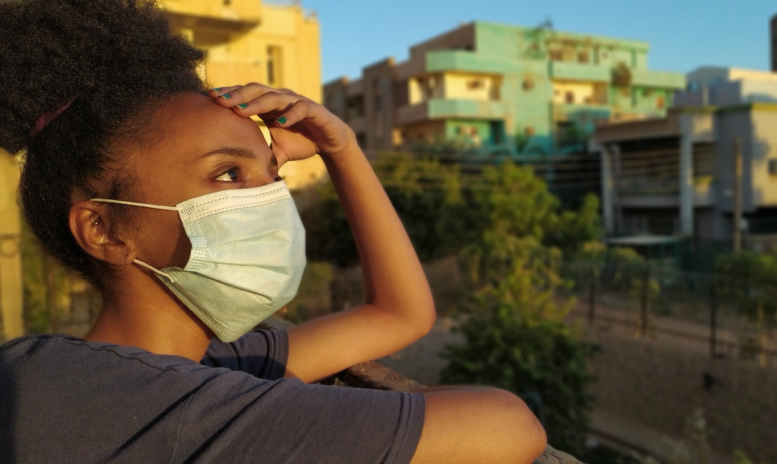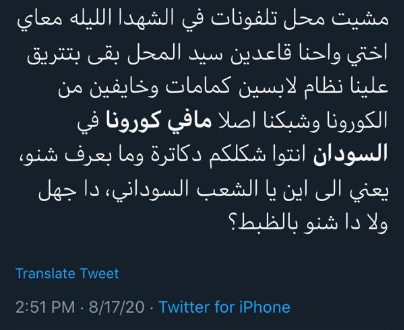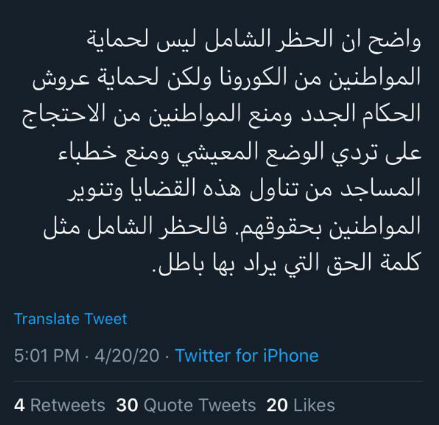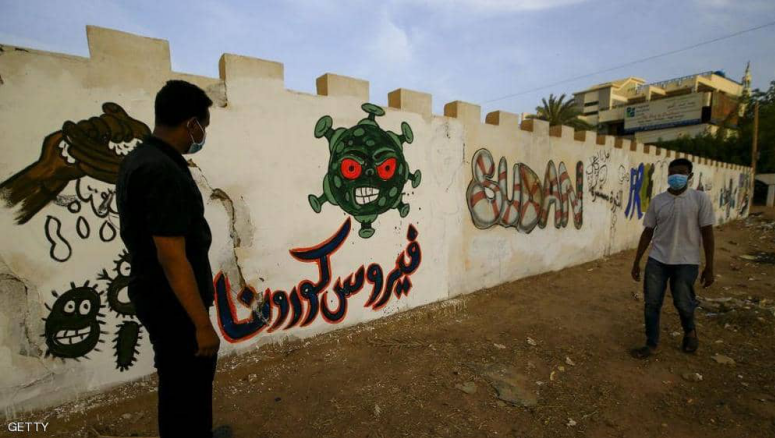
Photo credits: Nohad Khalid
The second COVID-19 wave has inevitably surged across the entire nation. One might think that this would cause people to naturally become more cautious, follow the instructions of official channels, and stay home. What we’ve come to learn the hard way is that the era of attentiveness towards the pandemic has come to an end in the eyes of Sudanese people. Not only that, but the spread of rumors and false information is also constantly escalating due to various societal factors thoroughly ingrained within our community, pandemic fatigue, and the inescapable COVID-19 infodemic. So how can we alleviate the effects of these factors?
Sudanese Social Etiquette

Funeral of Al-Sadig Almahadi (Former PM and Leader of Al-Umma Party). Source: https://www.albawabhnews.com/4198438
The social fabric of Sudan – with its unique sense of collaboration and an excessive commitment to social obligations – reinforces the mass reliance of people on their peers as sources of information. These unparalleled positive traits have unfortunately transformed to the unmitigated cause behind the current outbreak. Many people view social distancing as a ghastly insult; when one refuses to handshake someone, they are met with an incredulous look that says “You think I can give you the virus? I thought we were close…”. It is clear that this very mindset also results in a mutual blind trust; nobody would think twice when told about a rumor from a close friend or relative, and the culture of questioning information can sometimes be misconceived as inexcusable insolence.
Many people would rather maintain their social status by succumbing to societal norms that not only require them to attend unnecessary events but also cave into the thick layer of nonchalance covering people. Wearing a face mask or following guidelines is often ridiculed or considered as “nonsudanese” attitude. “I went to an electronics shop at Al-shuhada with my sister today, and the shop’s owner started mocking us for wearing face masks, insisting that there is no Coronavirus in Sudan and therefore [only] doctors wear masks. Where is this going? What is this ignorance?” Female – Twitter (Screenshot below).

Source: Twitter
You see people forgoing precautions, having the time of their lives at concerts, gatherings, and weddings, and you think to yourself “Well, everybody else is doing it and they seem fine.” As more people come to believe in the idea, others hop on the bandwagon. As much as it is difficult to stay on track when others clearly aren’t, we need to find the motivation to fight such behavior and in turn, urge others to follow guidelines. Think about it, only one person taking this matter seriously could influence others within their circle to do the same. Let’s all try to be that person.
Pandemic Fatigue: How Does it Contribute to the Spread of Rumors?
Many of the factors aforementioned have led to the appearance of yet another ubiquitous phenomenon called ‘Pandemic fatigue’. Quite a self-explanatory term, but sadly enough, we’re all going through it somehow.
Nobody wants to spend time with others trapped behind a surgical mask while sanitizing every ten minutes. A lot of people have already gone through enough social isolation to naturally deter from repeating it. Many are following guidelines months after months, binge-watching every possible TV show, discovering hidden talents, all for the sake of maintaining sanity. Eventually, it is bound to feel pointless. The real challenge here is being able to integrate the basic prevention methods into our lifestyles.
This exhaustion paves the way for more rumors to spread. I have recently had an argument about whether or not asymptomatic carriers of the virus can be contagious. The truth is that this hypothesis has not been proven and there is no scientific evidence suggesting that. It is definitely easier to believe such news not just because they feel better during this draining period, but also because they provide answers. Nobody can explain why a lot of people haven’t yet contracted the virus despite their really poor protective measures, while others who barely go out end up catching it somehow. Such unanswered questions drive people to constantly look for justifications, and to our dismay, many of these happen to be completely wrong and nonfactual. An example would be this post from Facebook: “The results came out very quickly, and how would we not contract COVID-19? Our lives are never empty of crowds of people and [bread and gas] queues, or is it only high-level personalities that become infected with COVID-19?” Female –Facebook. Clearly, the virus does not discriminate when it comes to infection.
Managing the Social Infodemic
It is undeniable that the technology we continue to use and rely on has played a huge role in amplifying an infodemic. For the case of Sudan, the internet is constantly invigorating conspiracy theories and extreme polarization. A wave of profound mistrust for the government has unfurled. This also happens to be a natural outcome considering the past regime’s infamous methods for deliberately obscuring facts and accurate news. It certainly does not help that the current fragile political atmosphere allows for exacerbating chaos, where subjective opinions are mistakenly interpreted as facts, and facts as political propaganda. A thematic breakdown of rumors on social media was conducted recently by Internews, and 48% were based on the idea that COVID-19 is nothing but a hoax.

“It is clear that the lockdown is not to protect citizens from the Coronavirus, but to protect the thrones of the new rulers and prevent citizens from protesting against the deteriorating living conditions and prevent mosque preachers from addressing these issues and enlightening citizens of their rights…” Male – Twitter.
Many people still believe that this whole pandemic is a mere hoax, or a desperate attempt from the government to oppress our voices and divert our attention from the ongoing economic crisis.
Despite the attempts of social media sites to fight misinformation and fake news, the effect of digital illiteracy and inequality is still salient. Considering the immense amount of WhatsApp messages that are forwarded by everyone without any method of verification, it is plain as day that the majority of people believe most of the messages they receive. I find it ironic that as I am writing this, I received a WhatsApp message claiming that the only method for preventing the virus is by taking a lot of Aspirin (Screenshot below).

Forwarded WhatsApp message: “Breaking News from Germany: … Germany beats Covid-19, which is nothing but a cause of blood clots, therefore the most important treatment for it is Aspirin…”
This is dangerous because although some doctors have reported that low-level doses of it may be effective, large doses may temporarily or permanently reduce kidney function. What’s funny is that the only reason this was forwarded was the indication that this study was conducted in Europe, which for most Sudanese people is enough to prove the reliability of the source. The amount of false messages being obliviously passed around is countless. It could be audio of an alleged doctor describing how they overcame the virus by simple local remedies, or a persuasive influencer sharing so-called “facts” about the virus and how it does not affect us, Sudanese people, due to our climate, race, or even religious beliefs. Regardless of their contents, these nonfactual messages then spread like a wildfire, and the result of every click on the ‘forward’ option is an exponential increase in the number of believers of false information.
What Can We Do?
It is extremely challenging to combat false beliefs on a national scale due to the sweeping sense of indifference within Sudanese society. With the prevalence of pandemic fatigue, this issue is of concern because it is people’s lives that are on the line. At this stage, advocating and reminding people of COVID-19’s risks is key to diminishing the outbreak. If there’s a need for gathering, we need to keep groups small, maintain social distance and limit the numbers as much as possible, with a mask worn at all times. Check Andariya’s tips on pandemic fatigue and how we can solve it on Facebook, Twitter, or Instagram.

Part of a Covid-19 awareness raising campaign and graffiti. Source: Sky News Arabia
It is crucial for social media sites to enforce policies and regulations against fake news, but there is also a great responsibility falling upon each individual to constantly fact-check and mitigate the damage of misinformation and disinformation. This can be achieved by simply sharing reliable and official sources of information such as the WHO and Ministry of Health. Moreover, humanitarian organizations and community workers could promote wider access to information about the availability of testing facilities and their locations, and inquire about the obstacles experienced by people (especially vulnerable groups such as refugees). Wide support from the government is also needed for the effectiveness of awareness-raising campaigns; such as street theater and community engagement discussions. This would aid in identifying gaps, debunking rumors, and supporting the work of public health officials so as to eventually deflate the damage and carry us on to safe grounds.
